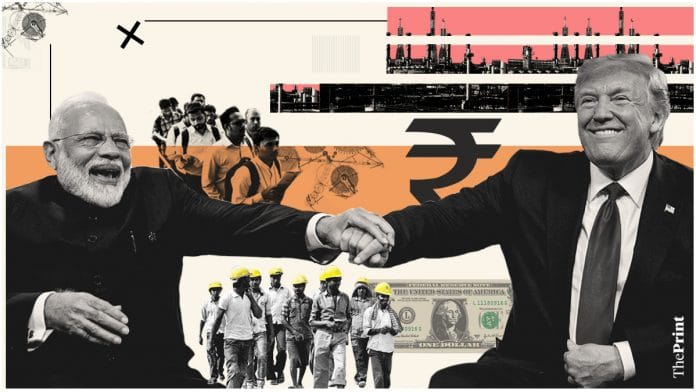Five days ahead of US President Donald Trump’s visit to India, he has said that “the big (trade) deal” is being saved for “later”. Trump also added that India has not “treated” the US “well”. In June 2019, the US had terminated GSP benefits for India, following which New Delhi imposed high customs duties on certain US products.
ThePrint asks: Will the spectacle of Trump visit without a trade deal boost India-US ties?
Even if we assume no big trade announcement, there are other issues on which discussions could take place
 Lalit Man Singh
Lalit Man Singh
Former foreign secretary
A state visit doesn’t have a single agenda. When a state visit takes place, the leaders of the countries involved discuss a range of issues of common interest. When President Trump comes to India, we expect that the discussion with PM Modi and other leaders will centre on matters, including economic and trade relations, security cooperation, the situation in the Indo-Pacific region, terrorism, cooperation in areas of science and technology and nuclear power.
Trade relations are only one of the many components that define a deep and complex bilateral relationship. Trade issues are not resolved in only one session. They require lengthy and technical negotiations between officials from both countries, something which has been happening at the level of commerce ministry but no deal has been concluded so far. With US trade representative Robert Lighthizer canceling his visit to India, it appears unlikely that trade issues have been resolved to the satisfaction of both India and the US. Even if we assume no big announcement on trade, there are plenty of other issues on which discussions could take place.
We expect that President Trump will strongly endorse India’s stand on cross-border terrorism and give assurance that it will not be tolerated. There also might be an agreement on seeing China as a principal threat to both countries.
Should not exaggerate the importance of a trade deal because US-India trade will still continue
 Neelam Deo
Neelam Deo
Former diplomat & Director, Gateway House
We should not exaggerate the importance of whether the trade agreement is signed or not during US President Donald Trump’s visit because trade between India and the US as it exists at the moment will continue in any case. Only a few items are under discussion. There are many other important issues to be taken up with the US president, including in areas of defence and strategic cooperation.
Issues such as US withdrawing the Generalised System of Preferences (GSP) trade benefits for India and being unhappy about India’s intellectual policy framework are technical issues that have to be discussed at the bureaucratic levels.
It is not that trade is not important in the US-India bilateral relationship. It is only that some specific issues could not be agreed upon in time for making an announcement on the trade deal during the visit. This does not mean that normal trade in goods and services, worth almost $150 billion between the two countries, will not continue.
If you talk about President Trump’s comments on India not treating the US well on trade issues, I feel he has his own unique way of talking. It makes everything seem more personalised. Relations between countries can be influenced by the perceptions of their leaders, but they are usually based on much deeper and longstanding mutual interests.
On trade deal, last-minute surprise always possible, especially when decisive leaders are involved
Rakesh Sood
Former diplomat and Distinguished Fellow, ORF
A summit-level visit always boosts bilateral ties because both sides want to hype it and the audio-visual media with its 24/7 coverage drives sentiment. Remember the pictures of PM Narendra Modi and Chinese President Xi Jinping sitting on a swing on the banks of Sabarmati in 2014 and the accompanying effusive commentary. The real question is: How long does the high last?
PM Modi enjoys putting on a spectacle and President Donald Trump loves a good show. From Trump’s tweet, it seems that he is expecting a big welcome and that can be ensured. Parallels are being drawn to President Eisenhower’s India visit in 1959 when large crowds in Delhi lined the streets along the motorcade route. I am sure Trump will love the idea that he is creating history once again.
The list of substantive issues on the table is not limited to just the trade deal; there are plenty of other announcements on the anvil that will boost bilateral ties between India and the US. And regarding the trade deal, a last-minute surprise is always possible. Very often, sensitive outstanding issues get resolved only at the last minute with the top leaders themselves getting involved, especially in the case of strong and decisive leaders.
Ultimately, the success of Trump’s visit will be gauged by the Twitter storm that it generates.
Apart from a few defence purchase agreements, there is little to look forward to Trump’s India visit
 Pranay Kotasthane
Pranay Kotasthane
Head of Research, Takshashila Institution
The US-India relationship over the last four years has been a case of one step forward, two steps backwards. The convergence on the threat posed by China has led to a deepening of military ties between the countries with the operationalisation of the Logistics Exchange Memorandum of Agreement (LEMOA) and signing of the Communications Compatibility and Security Agreement (COMCASA).
At the same time, both the US and India have been unable to move forward on the issue of trade. While the Donald Trump administration has hung on to notions of ‘reciprocity’, the Narendra Modi government has raised import tariffs and pushed itself into a corner. Trump’s position on Pakistan has also changed; the plan to reduce and eventually withdraw US troops from Afghanistan is contingent on an understanding with Pakistan. Finally, India’s falling economic growth trajectory has restricted our ability to negotiate both with the US and China.
Trump’s visit is unlikely to change any of these structural factors. Apart from a few defence purchase agreements, there is little to look forward to the US president’s tour.
Trade deal looks difficult now, but India is US’ major defence partner & plays key role in Indo-Pacific initiative
 Nayanima Basu
Nayanima Basu
Diplomacy Editor, ThePrint
US President Donald Trump will be the seventh American president to visit India. The last such visit was in 2015 by then-US President Barack Obama. So, in terms of spectacle, it is going to be huge. Any visit by a US president always has larger geopolitical significance not just in terms of boosting bilateral ties but also how New Delhi will steer its foreign policy. Besides, the US-India relationship is multifaceted in terms of how trade, investment and security are crucial aspects.
While a trade deal looks difficult at this moment, India cannot overlook the fact that it is a major defence partner of the US and the key role it now plays within the framework of the Indo-Pacific initiative. The US considers India as a counter to a rising China. President Trump’s visit is also crucial at a time when India is visibly shaking off even the last remains of the non-alignment policy, which it had been following since independence. So, there’s more to Trump’s tour than what meets the eye.
Also read: UK MP visa row: Modi govt intolerant or must engage with global critics on CAA, Kashmir?
By Unnati Sharma, journalist at ThePrint








This is the country that helped a war ravaged Europe get back on its feet with the Marshall Plan. Assisted Japan in becoming the first economic miracle of Asia, to be followed by others, all friends and allies of the US, who benefited from access to its market. As did China, now an equal and a serious threat / competitor. The generous vision of Bush – Rice is now a faint memory. Our family consumes walnuts, almonds, apples, will now have to add cranberries, although wife would draw the line at chicken legs. 2. This is a small hearted, transactional administration, which might endure till 2024. MEA will have to keep the great man in good humour. That should not extend to signing on to a policy of containment of a giant neighbour.